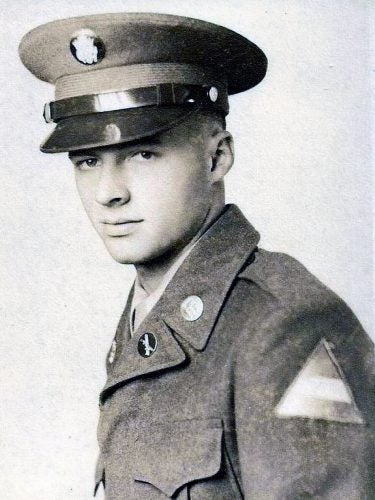- Second Lieutenant
- Korea
Biography
Second Lieutenant Ryan “Andy” Bressler was born in Harrisburg, Pennsylvania in 1928. At age three, he moved to Kingston, Rhode Island when his father, Raymond G. Bressler, assumed the role as President of Rhode Island State College (now the University of Rhode Island). Bressler spent the next ten years of his childhood were spent on the campus in Kingston. His family was the first to occupy the newly built URI President’s House. Bressler graduated from Lockwood High School in Warwick in 1946.
He enrolled at the University of Connecticut and left after his first year to join the Army. He served as an Infantry Instructor at Fort Knox, Kentucky from June 1947 until December 1948. He resumed his studies at the University of Rhode Island in January 1949 where he became the ROTC Cadet Colonel his senior year and a member of the National Society Scabbard and Blade. He was an honor student and a member of Tau Kappa Epsilon Fraternity. Bressler graduated in January 1952 with a Bachelor’s Degree in Agricultural Economics and was commissioned as a Second Lieutenant of Infantry.
While a graduate student at the University of Connecticut, he was recalled to active duty in May 1952 for immediate service in the Korean War. Second Lieutenant Bressler was assigned to the 31st Infantry Regiment, 7th Infantry Division. Four days after his arrival in Korea, he found himself leading an Infantry Platoon into combat. His platoon manned the listening posts for his unit on what was known as Pork Chop Hill. From December 1952, the outpost was part of the 7th Infantry Division’s defensive sector.
Pork Chop Hill was one of several exposed hill outposts in front of the Main Line of Resistance which were defended by a single company or platoon positioned in sand-bagged bunkers connected with trenches. Opposing the 7th Infantry Division were two divisions of the Chinese Communist Forces: the 141st Division and the 67th Division–both veteran, well-trained units with expertise in night infantry assaults, patrolling, ambushes and mountain warfare. Both the United Nations Command and the Chinese had used military operations on Pork Chop Hill to gain leverage or make political statements relevant to the armistice negotiations since early 1952.
The first battle on Pork Chop Hill occurred near Operation Little Switch, prior to the exchange of ill and injured POWs scheduled for 20 April. The Chinese command authorized the 17 April attack to demonstrate that agreement in contentious negotiations did not mean a willingness to quit fighting. Second Lieutenant Bressler’s unit was the focus of the Chinese attack.
In late evening of 17 April 1953, Chinese forces infiltrated the American positions and encircled his platoon’s position. As the battle developed, Second Lieutenant Bressler fought off enemy forces all around his Command Post bunker. He issued commands and provided inspirational leadership to his men as they fought the enemy within their trench and bunker fighting positions. Both American and Chinese artillery fires were brought to bear on the now mixed Chinese and American forces.
The Platoon bunker collapsed under the artillery shelling, killing several soldiers and mortally wounding and trapping Second Lieutenant Bressler. While his Platoon Sergeant tried valiantly to free the wounded Bressler and other wounded soldiers, he found he could not save them. Second Lieutenant Bressler ordered his Platoon Sergeant to leave the collapsed bunker and report to the Company Command Post to provide the Company Commander with critical information on the enemy’s disposition and strength. Second Lieutenant Bressler died of his wounds in the bunker on 17 April 1953.
Second Lieutenant Bressler made the ultimate sacrifice for his men, his unit and his nation. His exemplary devotion to duty, personal bravery and outstanding leadership is in the highest traditions of the military service and reflect great credit upon himself his family and the University of Rhode Island. Second Lieutenant Bressler was laid to rest with full military honors at the San Francisco National Cemetery at the Presidio, California.
Education
1952

